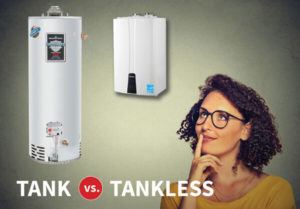Thinking of upgrading to a tankless water heater? Before doing so, learn the pros and cons of installing one – cost, requirements, and maintenance.
If it’s time to replace your water heater, you may be thinking of installing a tankless model in your home. To help you make the right decision about which kind to install, we’ll explain how tankless water heaters work and point out some of their advantages and disadvantages.
How Tankless Water Heaters Work
Tankless water heaters — also known as demand-type, on-demand or instantaneous water heaters — heat water directly, without the need to store water. A tankless heater has a flow sensing device that is activated whenever a hot water tap is opened. The unit then heats the water using either a gas burner or an electric element and directs the water wherever it’s needed in your home. Since there’s no tank that must be replenished, you don’t have to worry about running out of hot water. Once you close the hot water tap, the unit senses that the flow of water has stopped and shuts off the heating element.

Advantages Of Tankless Water Heaters
- They are smaller than conventional storage heaters, are wall mounted and do not take up floor space. Their size can make them particularly attractive in homes where square footage is at a premium.
- They can help you save on your energy costs. According to the U.S. Department of Energy, heating water accounts for about 30 percent of a family’s energy bills. Using a tankless water heater can reduce these costs by up to 50 percent, for an average annual savings of $80.
- They are durable and less likely to fail, causing potentially catastrophic flooding in your home. Tankless units have an average lifespan about twice that of conventional water heaters — 20 years or more.
Disadvantages Of Tankless Water Heaters
- Tankless units are more expensive. An electric tankless unit will cost about $500 to $700, roughly the same as a traditional tank model, while the cost of a gas tankless heater runs about $1,000 to $1,200. Beyond the initial cost, the national average for the installation of a tankless unit is slightly over $1,700. In many cases, existing piping must be extended or relocated, and for a gas unit, a safe vent must be installed to prevent carbon monoxide from accumulating inside the home. Even when taking savings in energy bills into account, it takes many homeowners about 20 years to fully recoup these expenses.
- “Tankless” does not mean “instant hot water.” Contrary to popular thought, a tankless water heater does not necessarily deliver hot water to your tap any faster than a conventional water heater. In fact, a tankless unit may be slower. It takes time for the tankless unit’s heating element to first heat water before delivering it to the tap.
- The flow of hot water is limited by the unit’s capacity to heat the water. Typically, hot water flows from a tankless heater at the rate of 2-5 gallons per minute, and that may not be enough for several simultaneous uses of hot water in your household. For example, taking a shower and running the dishwasher at the same time might stretch a tankless water heater to its limit. If you live in a multi-person household, compare tankless models, paying particular attention to the gallons per minute (GPM) flow of each model. The more people and the more simultaneous usage possibilities, the greater the GPM needs to be. One solution is to install multiple tankless units to meet the demands of a large household, but that can become very expensive.
- During power outages, tankless units will not produce hot water. Unlike conventional water heaters, there is no backup hot water source during these emergency situations.
- Tankless units are susceptible to failure due to hard water. Hard water is problematic for all water heaters but especially for tankless units. They should be drained entirely and their filters replaced monthly. They also need to be flushed on a regular basis. (Tank units need only be flushed every year or so.) If you don’t take these steps, hard water can destroy a tankless water heater in only about two years. Also, failure to follow these maintenance requirements can void the manufacturer’s warranty.
- Tankless units are complicated. Examine the internal workings of a typical tankless unit. You can quickly see how much could potentially go wrong with all the intricate technology tankless water heaters employ.

